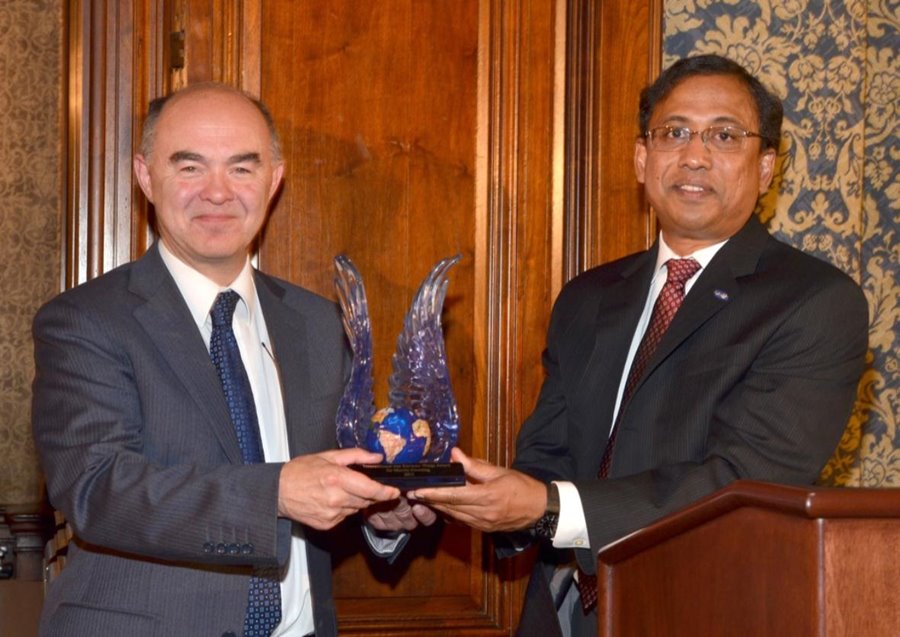
Sir Martin Sweeting, founder and executive chairman of Surrey Satellite Technology Limited (SSTL) and Director of the Surrey Space Centre at the University of Surrey, has been presented with the International von Kármán Wings Award for his contributions to aerospace.
As the 2012 recipient, Sir Martin Sweeting has been recognised for his technical and leadership contributions to aerospace academia and industry – in particular pioneering the concept of rapid-response, low-cost and highly capable small satellites for Earth observation, communications and space science.
Since 1985 the International von Kármán Wings Award has been presented to aerospace pioneers who have made outstanding contributions in the field of science and engineering over a sustained period of time. Previous recipients of the prestigious award include science fiction writer and inventor Arthur C Clarke, NASA Apollo astronaut Buzz Aldrin, and aircraft designer Burt Rutan.
The Aerospace Historical Society, and the Graduate Aerospace Laboratories of the California Institute of Technology (Caltech) presented the award in a ceremony on 13th September at the Athenaeum. Special guests including Dr. S. Pete Worden, Center Director of NASA Ames Research Center, and Mr. Elon Musk, CEO and Chief Designer at SpaceX, spoke of Sir Martin’s contribution to space.
Sir Martin commented: “It is a privilege to be recognised in the von Kármán Wings Award, and to share this accolade with visionaries and innovators that I greatly admire. During my career, small satellites have developed from being a research curiosity to become instrumental in scientific research, understanding our planet, and satellite navigation –I am thrilled to have played a part to make this all possible.”
David Willetts, Science and Universities Minister, praised Sir Martin and congratulated him on his award. He said: “Look at what he’s achieved. You begin with an idea in a university department, you then spin it out from the university, you then grow it as an independent company, you then accept that it is going to be bought by a very large operation like EADS Astrium but you are able to maintain the distinctive identity of SSTL within the wider business family. Each one of those transitions is so hard to manage and many companies come a cropper at each one. The fact that he has managed each one of these transitions tells me that he is a very successful business leader indeed.”
Professor Sir Christopher Snowden, vice chancellor of the University of Surrey, added: “Martin has enormous energy. He inspires everyone around him, in terms of being a leader but also an innovator, he has all the characteristics of a space entrepreneur. Martin’s work setting up SSTL and at the Surrey Space Centre was extremely important to the university. For many people space and Surrey are synonymous. He has created a legacy that will go on for many, many decades to come.”
As a leading authority on satellite technology Sir Martin is recognised in NASA, ESA and throughout the world. He was knighted by Her Majesty the Queen in the 2002 British New Year Honours for services to the small satellite industry and is a Distinguished Professor at the University of Surrey and a Fellow of the Royal Society.
Sir Martin founded SSTL with a vision to change the economics of space, making space more accessible to all. Utilising modern commercial off-the-shelf (COTS) technology, SSTL has developed a new market for small but advanced satellites and provides innovative and reliable cost effective solutions for established space agencies, emerging nations space programmes, commercial and research organisations.
About SSTL
Surrey Satellite Technology Limited (SSTL) is the world's leading small satellite company, delivering operational space missions for a range of applications including Earth observation, science and communications. The Company designs, manufactures and operates high performance satellites and ground systems for a fraction of the price normally associated with space missions, with 500 staff working on turnkey satellite platforms, space-proven satellite subsystems and optical instruments.
Since 1981 SSTL has built and launched 39 satellites – as well as providing training and development programmes, consultancy services, and mission studies for ESA, NASA, international governments and commercial customers, with its innovative approach that is changing the economics of space.
Headquartered in Guildford, UK, SSTL is owned by Astrium, an EADS company.
www.sstl.co.uk
About Surrey Space Centre, University of Surrey
The Surrey Space Centre (SSC), a Research Centre of the Faculty of Electronics and Physical Sciences (FEPS) at the University of Surrey, is a world leading Centre of Excellence in Space Engineering, whose aim is to underpin the technical development of the space industry through its advanced research programmes.
SSC, comprising over 90 researchers and faculty specialising in small satellite techniques, develops new innovative technologies which are exploited by the space industry. It provides well-focused space engineering education, postgraduate and industrial short courses, training the next generation space scientists, engineers, entrepreneurs and business leaders
www.surrey.ac.uk/SSC
Twitter: @SpaceAtSurrey
About Caltech
The California Institute of Technology (Caltech), led by President Jean-Lou Chameau, is a world-renowned science and engineering research and education institution, where extraordinary faculty and students seek answers to complex questions, discover new knowledge, lead innovation, and transform our future.
Caltech’s scientific, engineering, and technological contributions have earned national and international recognition, including the 32 Nobel Prizes awarded to its faculty and alumni. With one of the nation’s lowest student-to-faculty ratios, Caltech offers a rigorous science and engineering curriculum for approximately 900 undergraduates and 1,200 graduate students. Caltech’s 124-acre campus is located in Pasadena, California. The Institute also manages the Jet Propulsion Laboratory (JPL) for NASA, and owns and operates large-scale research facilities such as its world-renowned seismological laboratory and a global network of astronomical observatories that includes the Palomar Observatory and the W. M. Keck Observatory. Caltech is an independent, privately supported university.